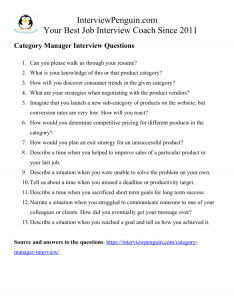Many retail stores (offline and online) sell thousands, or even tens of thousands of different products. In an ideal case, each product would be managed individually–the pricing, marketing, communication with vendors, the positioning in the store, etc. Collecting data and continuously optimizing the sales process, a retailer would eventually yield the best possible profits from the sales of each given product.
This concept isn’t realistic, however. Instead of employing hundreds of product managers, retailers and businesses employ several Category Managers, who are responsible for a certain range of products belonging to the same category. Imagine dried fruits, tinned fish, ties and bows, tennis rockets, and similar categories, depending on the retail or business segment.
Let’s have a look at interview questions you may face while trying to get this interesting and well-paid job.
Table of Contents
Can you please walk us through your resume?
Relevant experience typically isn’t necessary, but it helps if you did anything in sales, marketing, or procurement. If you already know what category of products you will manage (as long as they hire you), try to relate to it while describing your past experience.
In an ideal case, you should mention some achievements, or at least something you managed to improve in your last job. Maybe you negotiated great prices with the vendors, or suggested an improvement to product descriptions, or category order on a website, which resulted in better conversion rates.
Perhaps you discovered a new product, or branded something in a specific way, and sales skyrocketed. Or you helped to design a great advertising campaign (have your laptop ready to show them what exactly you did), or came up with a new sales pitch on the phone that turned out to be a game-changer in the business.
If you have no previous experience, ensure them that you understand the job description, know what they will expect from you in this job, and feel confident that you will handle it. Lacking real experience, you can refer to your studies, or skills and personal traits that will help you in the job. Attention to detail, analytical thinking, communication skills, or negotiation skills are just some of the skills that will definitely help you.
* May also interest you: Store Manager interview questions.
What is your knowledge of this or that product category?
It is absolutely crucial to do an excellent research about the product category before your interview. First and foremost, you should learn more about the following:
- What products belong to the category, sub-categories of products, different pricing levels.
- Main competitors of your future employer, unique products they have in their stores, USP of each main competitor.
- Seasonality in the product niche, the yearly trends.
- Latest innovations in the category, whether in form of design, functionality, pricing, or marketing strategy.
- Market segments you will work with, main demographic groups of customers.
- Anything else you can find about the product category.
Do not forget to talk with enthusiasm while demonstrating your knowledge of a given product category. They should get an impression that you did not prepare only to succeed in your interview. You actually like the product category, look forward to start working with it, and to make something big happen for their store, or business.
How will you discover consumer trends in the given category?
Everything starts with discovering consumer trends, and wishes. Unless you know what the customers want, and when they want it, you can hardly make the right purchases and run successful campaigns. Do not be afraid to show some imagination and suggest some alternative methods of discovering trends.
The most obvious (and typically also most accurate) way is relying on historical data. Seasonal trends repeat year after year, in almost all niches. If your predecessors in the job, or other managers in the company, did their reporting, you can easily look at the sales of different sub-categories of products within the main category, and discover trends.
You can suggest also more creative ways of finding out the trends, however. One is talking with customers. This can be done directly in a brick and mortar place–asking them about their shopping trends, doing a quick questionnaire with them while they stand at the checkout, etc. It is even easier online, with polls and online forms they can complete with a few clicks. You can even offer them a small gift or a discount coupon as a reward.
Another technique consists in spying on your competitors, the most successful retailers in the given product segment. They are successful for a reason, and likely know what they are doing. It helps to visit their places from time to time. Seeing what they advertise, their pricing strategy, the quantity of products they have in the stores, etc, can definitely help you discover the consumer trends in your product category.
What are your strategies when negotiating with the product vendors?
In most product categories, your strategy will be quite simple–you will try to get the best possible price. Profit margins are tight in retail, and the better purchasing price you get, the easier it will be for you to eventually make profit.
I suggest you to focus on building long term relationships with the vendors. You won’t just make a phone call, or order your stock online. On the contrary, you will try to meet the vendors personally, to understand their business model, and the conditions they can offer you.
Trying to build a good relationship with the decision makers, you will try to secure the best deals. You can talk about long term cooperation, guaranteed order quantity, or even exclusive deals. Sure, some of these may not be possible with each vendor, or even most of them. And the size of your store also determines what you can offer to ask for. On the other hand, it won’t hurt sharing some creative ideas in your interview. Whether you manage to materialize them in your job is another thing…
* You may also like: Social media manager interview questions.
Imagine that you launch a new sub-category of products on the website, but conversion rates are very low. How will you react?
First of all, ensure them that you won’t panic. With new categories and sub-categories, everything is about testing and optimizing the campaigns. Hence you will run some tests, experiment with different sales funnels, try to advertise some imaginary launch discounts, etc.
And of course you will track and monitor everything, so you can work with the data, and identify the weak spot in the sales process, so you can address it later on. Step by step, you will work your way towards a positive ROI, and the best possible conversion rate.
How would you determine competitive pricing for different products in the category?
Ensure them that you plan to rely on data-driven decisions. You will have your master sheet in MS Excel (or in a similar software product), where you will collect and update the data about your competitors. Knowing what they sell, and for how much, can give you a good hint about the optimal pricing for your store.
However, as a good category manager you should not blindly follow the strategies of your competitors. First an foremost, you should do your math, and know your expenses (all expenses associated with the sales of as given product), to be sure you won’t sell with a loss. Selling with a loss makes sense only when you try to gain the prime position in the market, when you can afford it for some time, and perhaps try to eliminate some of your competitors.
If you work with some high-class items, or products that have a significant impact on the life of the consumers, you can even talk about value-based pricing. Maybe you can get (or manufacture) the product for $10. But it has a potential to save the consumers $100 each month on expenses, and they purchase it only once a year (this is an example, of course).
In such a case, you can sell it for $100, or even more, as long as you manage to advertise it in the right way, so the consumers understand the value it can bring to their life…
Other questions you may face in your category manager job interview
- How would you plan an exit strategy for an unsuccessful product?
- Describe a time when you helped to improve sales of a particular product in your last job.
- Describe a situation when you were unable to solve the problem on your own.
- Tell us about a time when you missed a deadline or productivity target.
- Describe a time when you sacrificed short term goals for long term success.
- Narrate a situation when you struggled to communicate someone to one of your colleagues or clients. How did you eventually get your message over?
- Describe a situation when you reached a goal and tell us how you achieved it.
Conclusion, next steps, answers to questions
Category Manager is a fancy job title, and it always attracts dozens of job applications. You will compete with many people for the job, which makes this interview even more difficult as it already is, with various behavioral and situational questions you will face while trying to impress the hiring managers.
But luck always favors the prepared. Try to learn as much as you can about your future employer, and about the category of products you will manage.
And if you struggle with your answers, or simply want to know something your competitors won’t know in the interview, have a look at our Interview Success Package. Up to 10 sample answers to all tricky interview questions will help you stand out, and eventually sign a Category Manager employment contract. Thank you for checking it out, and I wish you good luck in your interview!
Matthew
* You can also download the full list of questions in a one page long PDF, and practice your interview answers anytime later:

May also interest you:
- Product manager interview questions – Some of them overlap with the interview for category manager. Check them out and get ready.
- Salary negotiation tips – Get as much as you deserve when they start talking money in the interviews.

